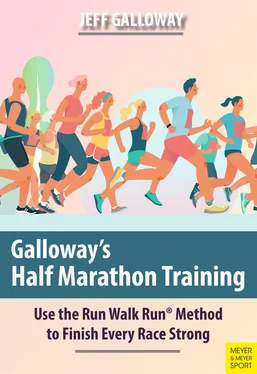TOP 3 GOALS FOR FIRST TIME HALF MARATHON RUNNERS
1.Finish in the upright position,
2.with a smile on your face, and
3.wanting to do it again.
These three components define the first level of success in any training program, and the degree of enjoyment of each long run. If this is your first race experience at the 13.1 distance, visualize yourself coming across the finish line, demonstrating these three behaviors. The more you focus on this image, the more likely you are to realize this during most of your runs.
RUNNING ENJOYMENT
Find a way to enjoy parts of every run–even the speed training (if you are a time goal runner). Most of your runs should be.…mostly enjoyable. You increase the pleasure of each run by inserting a few social/scenic/mentally refreshing runs every week. Your desire to take your next run, and move up your training to the half marathon and beyond, is enhanced by scheduling the fun sessions first, with one to three of them every week.
STAY INJURY FREE
When injured runners review their journal, they often find the causes of aches and pains. Make a list of past problems, and repeated challenges. After reading the injury section of this book, make the needed adjustments. As you eliminate the injury stress, you can eliminate most (or all) of your injuries.
AVOIDING OVERUSE OR BURNOUT
All of us get the warning signs of overtraining. Unfortunately, we often ignore these or don’t know what they are. Your training journal is a wonderful tool for tracking any possible ache, pain, loss of desire, unusual fatigue that lingers, etc. If you develop an injury, you can review your journal and often find the reasons. This helps you to become more sensitive to future problems and make conservative adjustments in the plan to reduce upcoming injury risk.
BECOME THE CAPTAIN OF YOUR SHIP
When you balance stress and rest, running bestows a sense of satisfaction and achievement that is unsurpassed. Intuitively, we know that this is good for us, mentally and physically. When we decide to use the monitoring tools in this book we take a major amount of control over fatigue, injuries, energy level, and enjoyment of running.
WHEN TO SET A TIME GOAL
After finishing your first half marathon you may choose a time goal, after reading the “Predicting Race Performance” chapter. Many veterans (myself included) decide to stay within their capabilities, use the “to finish” schedule, and enjoy the experience.
I commend all who decide to take on an endurance challenge. Almost everyone who makes it to the finish line will tap into a mysterious and complex source of continuing strength and balance: the human spirit. Enjoy the journey!

Chapter 3
IMPORTANT HEALTH INFORMATION
MEDICAL CHECK
Check with your doctor’s office before you start a strenuous training program. Keep the doctor informed of cardiovascular system irregularities or aches and pains that could be injuries. At first, just tell your physician or head nurse how much running you plan to be doing over the next year. Almost every person will be given the green light. If your doctor tells you not to run, ask why.
Since there are so few people who cannot train even for strenuous goals (if they use a liberal run walk run formula), I suggest that you get a second opinion if your doctor tells you not to run. Certainly the tiny number of people who should not run have good reasons. But the best medical advisor is one who wants you to get the type of physical activity that engages you–unless there are significant reasons not to do so.
RISKS: HEART DISEASE, LUNG INFECTIONS, SPEEDWORK INJURIES
Running tends to bestow a protective effect from cardiovascular disease. But more runners die of heart disease than any other cause, and are susceptible to the same risk factors as sedentary people. Like most other people, runners at risk usually don’t realize it. I know of a number of runners who have suffered heart attacks and strokes who probably could have prevented them if they had taken a few simple tests. Some of these are listed below, but check with your doctor if you have any questions or concerns.
Your heart is the most important organ in your body. This short section is offered as a guide to help you take charge over your cardiovascular health to maintain a high level of fitness in the most important organ for longevity and quality of life. As always, you need to get advice about your individual situation from a cardiologist who knows you and specializes in this area.
| Note: |
The information in this book is offered as advice from one runner to another, and is not meant to be medical advice. Having a doctor/advisor will not only help you through some problems more quickly, but contact with a responsive and supportive medical advisor will improve confidence and motivation, while reducing anxiety. |
Risk Factors: Get checked IF you have two of these–or one that is serious
• Family history
• Family history of cardiovascular problems
• Poor lifestyle habits earlier in life (alcohol, drugs, poor diet, etc.)
• High fat/high cholesterol diet
• Have smoked–or still smoke
• Obese or severely overweight
• High blood pressure
• High cholesterol
Tests
• Stress test–heart is monitored during a run that gradually increases in difficulty.
• C-reactive protein–has been an indicator of increased risk.
• Heart scan–an electronic scan of the heart which shows calcification, and possible narrowing of arteries.
• Radioactive dye test–very effective in locating specific blockages. Talk to your doctor about this.
• Carotid ultrasound test–helps to tell if you’re at risk for stroke.
• Ankle-brachial test–can detect plaque buildup in arteries throughout the body.
None of these are foolproof. But by working with your cardiologist, you can increase your chance of living until the muscles just won’t propel you farther down the road–maybe beyond the age of 100.
SHOULD I RUN WHEN I HAVE A COLD?
There are so many individual health issues with a cold that you must talk with a doctor before you exercise when you have an infection.
Lung infection–don’t run!A virus in the lungs can move into the heart and kill you. Lung infections are usually indicated by coughing.
Common cold?There are many infections that initially indicate a normal cold but are much more serious. At least call your doctor’s office to get clearance before running. Be sure to explain how much you are running, and what, if any medication you are taking.
Infections of the throat and above the neck–most runners will be given the OK, but check with the doc.
RISK OF SPEED
There is an increased risk of both injuries and cardiovascular events during speed sessions. Be sure to get your doctor’s OK before beginning a speed program. The advice inside this book is generally conservative, but when in doubt, take more rest, more days off, and run slower. In other words…be more conservative.
 Читать дальше
Читать дальше














